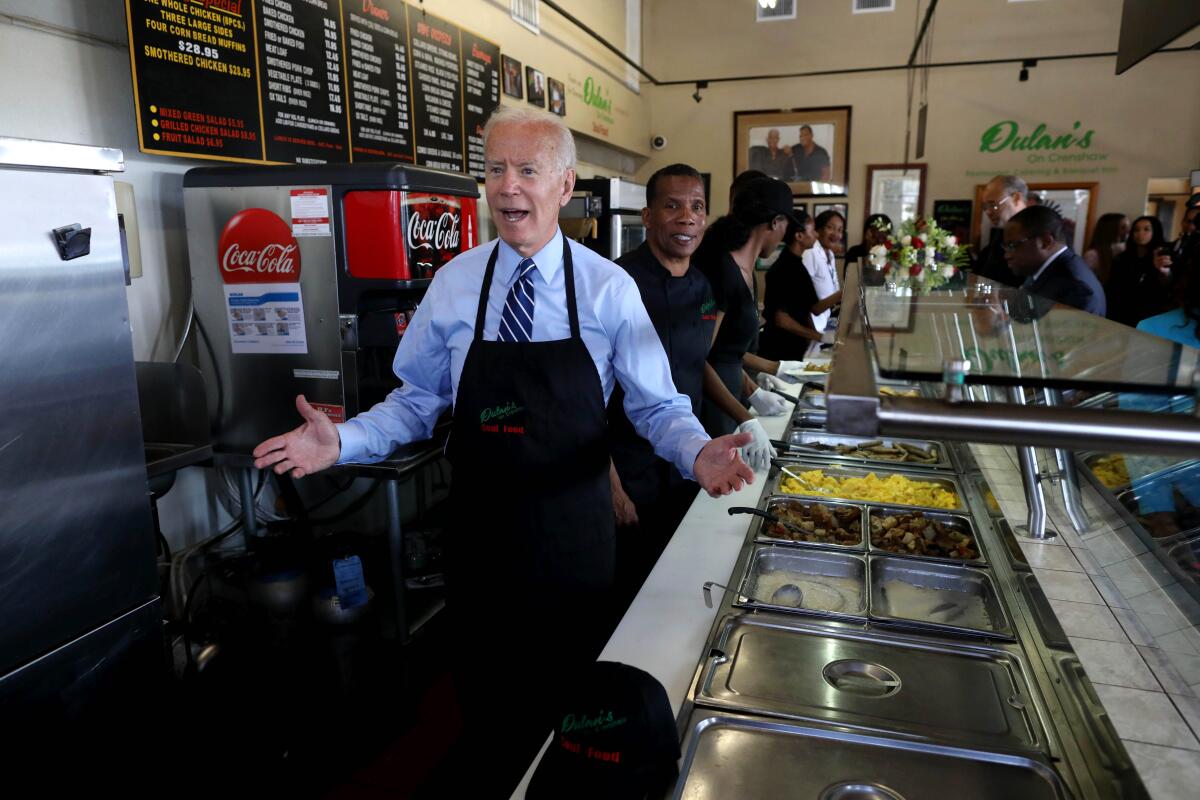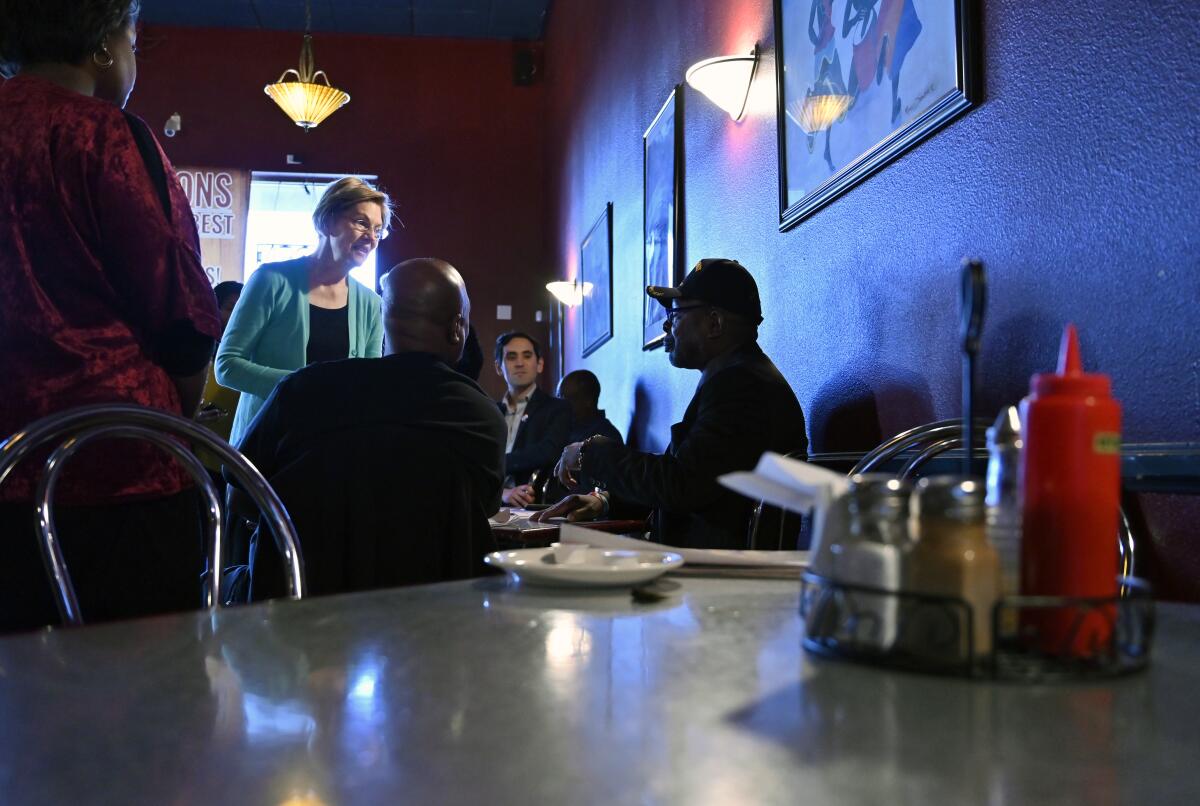Candidates love the ‘ethnic food’ photo op, but there are better ways to reach nonwhite voters

- Share via
During a third-grade lesson on Latino culture, my teacher assigned me a Spanish name: Francisco.
I never thought that information would be of use to anyone, so I’ve never shared it. But Democratic presidential candidate Amy Klobuchar thought differently last week when she proudly told a group of workers from the Nevada culinary union that, when she was in the fourth grade, “Me llamo Elena.”
In the video, the largely Latino audience responded with deafening silence. Pundits and social media posters quickly accused Klobuchar of pandering to Hispanics, or “Hispandering.” It was the latest example of what has become a familiar political tradition among people of color: laughing at the cultural blunders of presidential candidates.
Over the years, candidates’ attempts to reach people of color have gifted us with a long and hilarious highlight reel of cultural gaffes, starting with Gerald Ford biting into a tamale — still wrapped in its husk — during his unsuccessful 1976 presidential run. Last year, then-South Bend, Ind., Mayor Pete Buttigieg stumbled with Latinos by admitting to enjoying salsa mixed with ranch dressing. And in 2016, we got the unexpectedly poignant existentialism of Hillary Clinton staring down a cup of boba tea in Flushing, N.Y.
I’ve always found these awkward outreach efforts terribly outdated and embarrassing for all parties. Who is swayed by these gestures — the occasional mangled words of Spanish, or the hackneyed “ethnic food” photo op?
They seemed to be premised on some bizarre assumptions. If Klobuchar gets grass jelly in her half-sweet, no-ice boba tea, does that mean she understands Asian American youth culture? Should future candidates practice eating tacos? And what guarantee is there that these attempts will amount to anything more than a photo op?
I decided to visit some Los Angeles eateries popular with presidential candidates and see if I could find anyone whose vote was swayed by appeals like these. I also asked people what kind of outreach they would choose, if they had the chance to give the campaigns some advice.
I started at Dulan’s on Crenshaw, a cafeteria-style soul food restaurant that has hosted Joe Biden and former President Obama.
Last year, Biden donned an apron and helped serve breakfast to a group of community leaders there. Reginald Ridgeway, longtime pastor of the Faith Way Missionary Baptist Church, wasn’t aware of the visit. Still, he’s a Biden supporter, and he appreciates that the former vice president decided to spend time talking to members of the community.
Knowledge of African American culture and eating soul food — these things weren’t as important to him as spending the time, Ridgeway said.
“You don’t have to eat our food. I’ll eat my own food. Just listen to us … give us a genuine feeling that you hear what we have to say,” Ridgeway said. “We can eat at a Taco Bell if we get that.”
Ridgeway thinks the stakes are too high in this year’s elections to worry about cultural gaffes and who said what to whom. He’d love to see a female president someday and believes in many progressive causes, but his main priority is electing anybody who isn’t President Trump.
“The only reparations I need is being true to the Constitution,” Ridgeway said.
Barbara Melancon and Willimae Fulton, two social workers having lunch, also appreciated that candidates took time to stop by. But they were tired of symbolic gestures of solidarity.
“We’ve seen so many candidates come here and do this, but once they get into the office, they just forget us,” Melancon said.
“We should hold them to a higher standard,” Fulton said. “It’s 2020. Time is up for these traditional politics. I’m supposed to vote for you just because you enjoy our culture? Nah,” she said. “It’s all about what are you going to do.”

My next stop was King Taco #10 in Pico-Union, where Clinton, Biden and many others have made stops. Biden ate some tacos here last year, accompanied by Mayor Eric Garcetti.
Jesse Ramirez, a recent USC graduate, didn’t remember Biden’s visit. He appreciates when candidates try to speak Spanish and show an interest in Latino culture. Still, he’s going to cast his vote based on policy.
“They’re trying to reach out,” Ramirez said. “Effort is good but that doesn’t mean they get my vote.”
But Rudy Lico, 20, was mostly unimpressed.
“We’re not all about tacos,” Lico said.
My last stop was Mr. Boba in Koreatown, where last year Biden met with Korean American community leaders over a cookies-and-cream milkshake with boba. Aaron Vallejo, 29, said Biden showing up in Koreatown “surprised the hell out of me.”
“To see this kind of person come here, it’s really rare. It kind of puts Koreatown on the map,” Vallejo said.
At the end of my presidential campaign food crawl, I felt differently about these cultural gestures. Just because they are symbolic doesn’t mean they can’t be powerful, said Karthick Ramakrishnan, professor of political science at UC Riverside.
There’s a generational divide in the way these messages are received, he said. To college-educated, second-generation or younger Americans like myself, these gestures are often condescending and reductive. But to immigrants and those who rarely feel inclusion in U.S. politics, even clumsy and awkward attempts to reach out are seen as long-awaited signs of respect and inclusion.
“It sends the signal that your culture, your community, your food, is American too,” Ramakrishnan said. “It suggests that immigrants don’t need to assimilate, that the candidate is comfortable with the prospect of a multicultural nation.”
And research shows these gestures do help garner votes, said Rudy Alamillo, assistant professor of political science at Western Washington University.
In an analysis of 2016 presidential candidate Jeb Bush’s appeal among Latino voters, Alamillo and his coauthor Loren Collingwood found that Bush’s identity-based strategy was one of the most influential factors. Cross-racial mobilizations — things like speaking Spanish, emphasizing that he has a Mexican American wife, and commercials depicting Bush eating Mexican food — were a more powerful factor than even party identification or ideology.
The efficacy of these appeals, Alamillo said, allows Republicans to go after Latino votes without meaningfully supporting causes and issues that Latinos care about.
“They can run ads in English saying we’ll build a wall and favor mass deportations,” Alamillo said. “But in Spanish, they’ll just make identity-based appeals. It allows them to run two different campaigns at the same time.”
We’re headed toward a future in which racial politics will become a regular part of political campaigning. Winning elections in an increasingly diverse country will require many kinds of cultural appeals. But if our votes can be easily bought with gestures of respect and inclusion, we lose the chance to advocate for the causes most important to us.
I have to admit I would be highly entertained by the sight of future presidential candidates trying to suck the meat off chicken feet at dim sum, but I want so much more than that. And so did a lot of the people I spoke to.
Ramirez proposed a “King Taco Town Hall” where presidential candidates would answer questions posed by customers and locals for an hour, rather than primarily addressing cameras and gathered media.
Melancon suggested that the candidates sit down with gang members to draw attention to the roots of crime and poverty.
Fulton said she’d love to see a presidential candidate shadow some social workers for a day to highlight the mental health crisis and flaws in the safety net.
Fulton also suggested campaigns hand out free school supplies in impoverished neighborhoods to point out the fact that schools in black and Latino neighborhoods receive unequal funding.
To me, all these suggestions sound far more practical and convincing than what any presidential campaign has tried. They show that it’s possible to convey symbolic cultural meaning as well as highlight substantive and meaningful issues.
And no one has to choke on a tamale.
More to Read
Sign up for Essential California
The most important California stories and recommendations in your inbox every morning.
You may occasionally receive promotional content from the Los Angeles Times.














